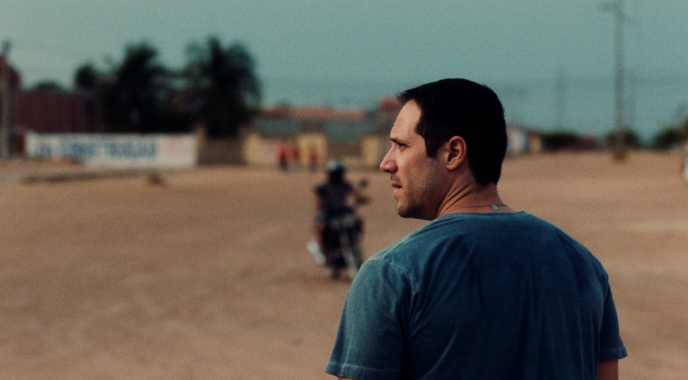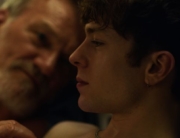Brazil’s entry for the 2022 best international film Oscar pairs two unlikely lovers in a story that challenges the notion of traditional masculinity. Private Desert is a slow burn of a film that does not spoon-feed its audience. Instead, it takes its time painting dual portraits of this current cultural predicament.
The film starts off with Daniel, played by Antonio Saboia, a military police officer in the major southern city of Curitiba. He is currently on unpaid leave and under investigation after a physical altercation involving a cadet. The incident serves as catalyst for what follows, but it is not depicted. Daniel lives with his elderly father, a retired police sergeant, who now has dementia. The only saving grace in Daniel’s life occurs late at night after he’s put his father to bed: He has intimate text conversations with Sara, a woman he has never met, who lives on the other side of the country. Soon after Daniel’s suspension and the news stories surrounding it, Sara has stopped responding to Daniel’s texts and phone calls.
While the incident at the police academy may seem at first to be the film’s main mystery, this turns out to be a red herring. The incident takes a backseat to Daniel’s pursuit of investigating the mystery closer to his heart: Why has Sara all of a sudden started ghosting him? So, early one morning he abandons his responsibility of caregiving for his father, as well as cooperating with the academy’s investigation, and hops on the road to drive 2,000 miles to the other side of Brazil in search of the woman he believes he is in love with, to finally meet her face-to-face and cement their relationship for good.
The remainder of this review will deal with a revelation about Sara. If you do not wish to know, then please do not read past this point.
After we have seen the gist of Daniel’s life, the film’s POV switches to Sara, who, during the day, goes by her birth gender and name, Robson (Pedro Fasanaro), and lives with her grandmother, an Evangelical Christian who wants her grandson to lead a straight life, even if it means going to conversion therapy. Although at face value Daniel and Sara live different lives and have divergent outlooks on life, they are going through similar enough experiences living with their elders for it to make sense how they would have formed a bond, sharing their innermost feelings over a dating app.
It helps to know some of Brazil’s recent history to pick up on some of the nuances. After the 2019 election of right-wing President Jair Bolsonaro, Brazilian minorities have faced having their rights stripped away, such as the LGBTQI+ community, as seen in another recent Brazilian film, Medusa, which also touches upon the country’s rising Evangelical movement. According to the press notes for Private Desert, the country has the highest number of fatal attacks on trans and queer citizens than any other nation annually. Today, Brazil is generally divided into factions of conservatism in the south and progressivism in the north, according to director Aly Muritiba. His and Henrique dos Santos’s script positions Daniel and Sara as representatives of those two factions.
However, there are parts of the film that will have some viewers stumped. The film takes a step-by-step approach, keeping the story contained within the timeframe of the events portrayed on-screen, especially when Daniel travels two thousand miles to find Sara. Meaning, we never see the inciting violent altercation that led to Daniel’s suspension, nor are we given a solid retelling of exactly what happened. (One clue: Daniel wears a cast on his right arm.) Equally, we are not filled in on the extent of Daniel and Sara’s texting relationship. In fact, the film begins after Sara has already stopped responding to Daniel, so most of what we gather is from Daniel’s point of view.
As a result, in many ways, the film is overwritten and yet elliptical in others. Still, some viewers will accept these story choices and warm up to Private Desert’s strong performances and positive message. This is one gem that LGBTQ+ film aficionados may hold up in high regard in years to come, alongside such movies as 2017’s A Fantastic Woman. Mainly because of its stately pace, others, though, may find it a bit too dry.

















Leave A Comment